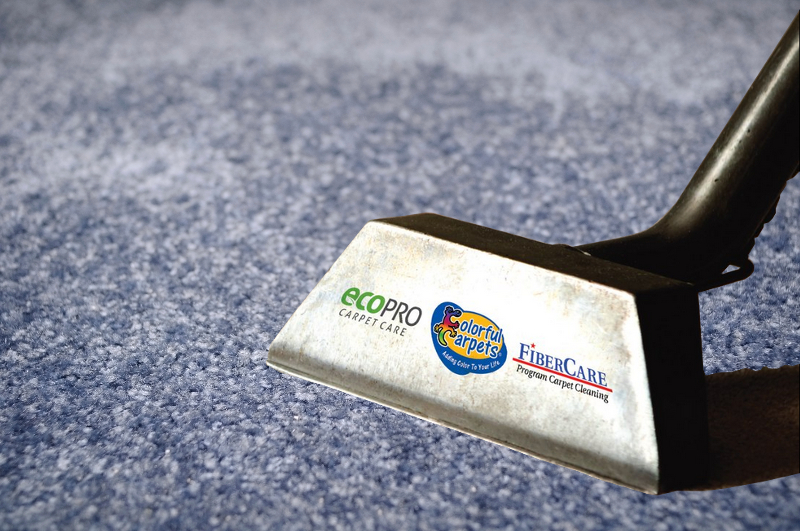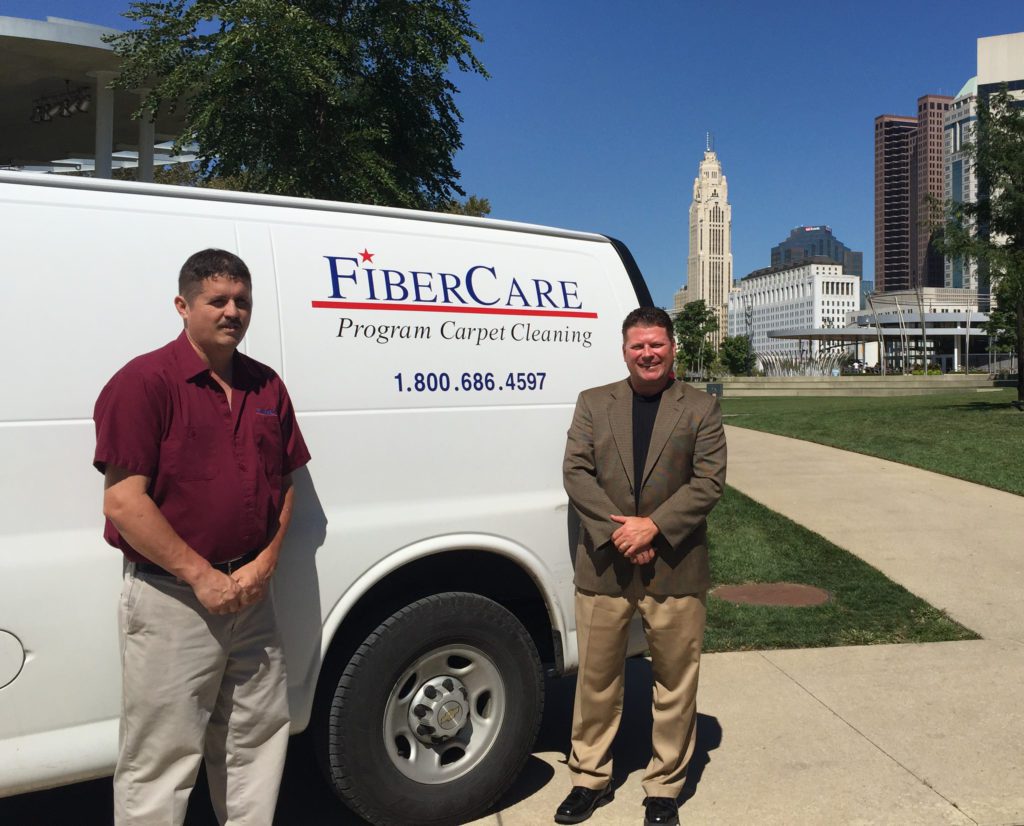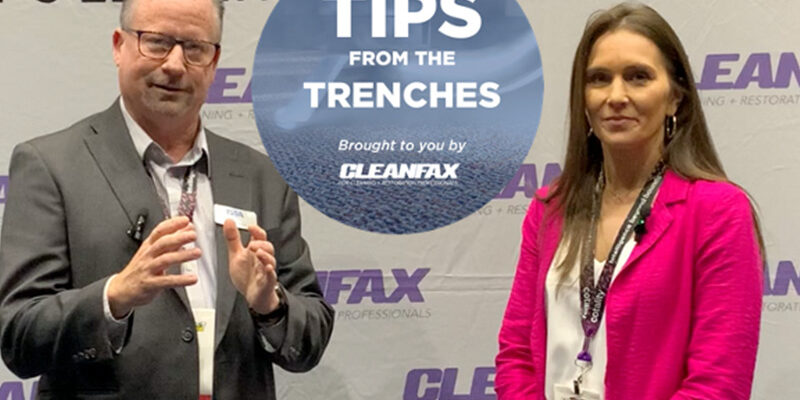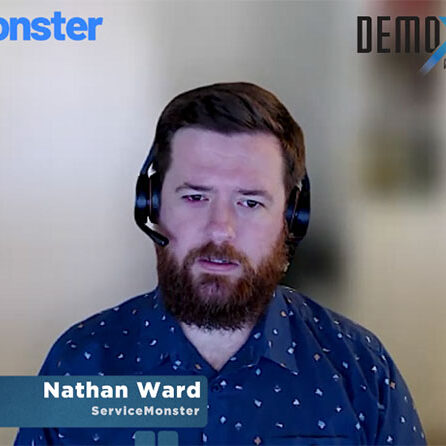2016 Carpet Cleaning Industry Leaders Review

Whether your company started in the back of a car or was passed down for generations, you’ve got to appreciate the story of how another cleaning company found its way. Everyone loves a success story. In the following pages you’ll find three such stories from three very distinct professional cleaners — our 2016 industry leaders.
The first is from an owner-operator who stays booked far in advance but doesn’t feel the need to push expansion. The second story comes from a niche service provider of carpet color restoration cleaning who says being highly specialized has been the key to success. And the last story looks at a large and still-growing company that proves the importance of relationship building in this industry.
No single path to success is the right one, and what works for one company won’t necessarily work for another, but we hope that in these stories each reader finds a takeaway, something that spurs an idea for success in their own companies.

The still-unfolding history behind ECOPRO LLC of Beaumont, CA is a true mom-and-pop, “pull yourself up by your bootstraps” story.
“We literally started this company out of the trunk of our 2004 Toyota Highlander with a U.S. Products portable,” says owner Joe “EcoPro” Torrez. “The odds were against us, as all our competitors were running truckmounts and we were in a recession.”
But Torrez and his wife Michelle managed not just to get stay in business in these tough conditions, but to make a name for themselves and grow a following since initially creating a business plan in 2006 and officially launching in 2008.

The Torrez family
ECOPRO makes carpet cleaning a family affair
Growth made simple
Though it’s still small — a one-truck operation with Joe performing the physical work and Michelle running the office — the company is busy.
“We currently book a good month in advance, with mostly returning clients and referrals,” Torrez shares.
And while Torrez has plans to add employees as well as more vans within the next five years, substantial growth isn’t what he focuses on. “We are in no rush for growth. With dedicated hard work, it will be produced with time,” he says. “There is no big hurry. We do have goals, but quality always wins over quantity.”
ECOPRO boasts a modern website and has established a company personality on social media, where it stays engaged with customers, Torrez reports the best marketing has been word of mouth. Torrez shares, “I just work hard and honest. The clients do the rest.”
Success from the ground up
Cleaning has always been a passion for Torrez, who began cleaning carpet at age 12 for his mother’s cleaning clients at a Seal Beach, CA, senior community.
“I love cleaning; it’s just something I’m good at,” says Torrez. “I enjoy learning from and meeting clients. I’m also addicted to seeing the innovation in all the tools.”
Despite Torrez’s knack for the industry, it took a while to find the confidence in his work needed for success. “Once I learned to overcome that doubt, I then began seeing our company take greater definition,” he shares.
Joe and Michelle took their business very seriously right from the beginning and put all they had into it.
“We took everything we learned beforehand and then investigated and learned the industry from every possible source,” Torrez says. “To us it’s more than a job. We truly care about our clients receiving world-class treatment. We are there to serve them, help them and provide sound advice from our experience.”
Torrez says he has no regrets when it comes to his business. “As a man of faith I believe God has led my path. I’ve enjoyed and learned from everything,” he explains. “To overcome [challenges], I turn to the Bible and prayer.”
The industry has taught Torrez much about business, and he thinks it’s important for those new to the industry to know it is fine to start small. He recommends attending classes and learning from your fellow cleaners.
“Always be humble; never speak negatively of your fellow cleaners,” he recommends.” We may not all do it the same, but we all serve the same purpose.”
In closing, Torrez says, “Don’t be afraid to sweat. Sweat is actually a prerequisite of the job.”

“I entered this industry because of my dog,” Colorful Carpets owner Chris Howell says without hesitation.
After buying his daughter a puppy, Howell found his brand-new carpet “dyed” from the untrained dog’s accident. When he found no one in the Washington, D.C., area to correct the carpet’s color, he discovered an open door. “I saw a niche business opportunity with absolutely zero competition,” he says. “Carpet dyeing is a completely untapped market with enormous potential.”

Chris Howell Bringing color back to carpet from D.C. to Dubai — and other places worldwide.
While few in the carpet care industry likely would say a dog brought them to the industry, many can sympathize with the issue, and 15 years later, Howell says the company still has no competition.
Located in Maryland and servicing the Maryland, Virginia and District of Columbia areas, Colorful Carpets was established in August 2000. It provides expert color repair services for carpet and rugs, specializing in the color restoration of intricately patterned Persian rugs. The majority of the company’s work is repairing bleach spots, and it provides a service which adds a small amount of the carpet’s original color to the cleaning solution so the carpet color is restored as it is cleaned.
“I derive tremendous satisfaction from seeing the happiness on the faces of our customers when we restore their carpet or rugs back to the original color,” Howell shares. “Carpet dyeing is designed to be an extremely cost-effective alternative to carpet replacement.”
Though Colorful Carpets has found great success, even cleaning some well-known landmarks — including the White House, and the Emirates Palace in Abu Dhabi, among others — it has found some difficulty creating awareness of its niche industry sector.
“Most people are unaware that carpet dyeing exists or that it can be successfully done,” Howell explains. But he adds, “A quick demonstration of the services quickly convinces people the service is legitimate. Customers are amazed when they see that their freshlydyed carpet can be walked on 30 seconds after dying.”
Growing and changing
Colorful Carpets started as a one-man crew and added its first employee after only a year. Howell says, “We prefer a smaller sized company.” Though the company has had as many as five service vans on the road, it has downsized in recent years.
“We are more profitable now than we were when we were larger and are able to be much more selective about which jobs we take on,” he adds.
Howell had a busy and eclectic career before he began Colorful Carpets. Despite never having any formal business training, he has managed and owned several companies in his life.
During college, he established his first automotive repair business to work his way through school. He owned and operated more repair shops and worked as a facilities manager at a large boarding school in Michigan.
Now Howell is planning another transition as he is in the process of becoming a full-time educator. He has traveled the world teaching carpet dyeing and has many seminars set up in 2016 in the U.S. and abroad.
Find some focus
For Howell and Colorful Carpets, entering a niche market has meant all the difference, and he recommends this concentrated approach to others.
“Offer a specialized service. It’s too difficult to compete with hundreds of other companies who are all offering the same product or service. It just drives your prices down,” he advises. “Focus on high-end clients who have the money to pay for high quality services.”
Howell echoes Miracle-Gro creator Horace Hagedorn: “Find an untapped need and fill it.”

Ohio’s FiberCare has made a name for itself for over 20 years and now is looking to grow even larger. A CIMS-GB certified company, it cleans 1.5 million square feet of carpet per month on average.
The company provides traditional and specialty floor cleaning for “leading end user” commercial customers, as well as more than 150 contract customers (including Fortune 1000 headquarters) across Ohio, Kentucky, Indiana, northern West Virginia and southern Michigan.

Lee Wallace, operations manager (left), and Jamie Messenger, general manager
This team can clean 3000,000 square feet in a single weekend.
Established but growing
“We grow steadily but not at an overwhelming pace, and we experience a very high customer retention rate,” says FiberCare General Manager Jamie Messenger. The company has grown 120 percent in the past eight years, despite the economic downturn.
Messenger says the company did this by forming strategic partnerships and by expanding the services it offered. Diversification is something the company is still focused on. FiberCare plans to grow in other markets with a sales push and using its proven growth strategies to “beef up operationally and gain market share.”
“We have a great footprint in many [areas] already; we just need to maximize our potential,” Messenger explains. “We are always looking to pick up new service lines or look at new ways of operating.”
The man in charge
Messenger worked in several different industries before he found his place at FiberCare. After graduating college with a degree in social work, he worked for a few years with juvenile delinquents.
Messenger found his way into business like his father, working first as a sales representative for a large, manufacturing sales agency. He then gained more sales and business experience working with a parking lot and street sweeping company. He says, “This is where my passion to perform and serve came alive.”
He finally settled into a property manager position at a huge commercial real estate company.
“I learned what made some vendors good but others great,” he says. “That experience changed the way I viewed sales people and service organizations. It gave me a clearer insight as to how we want to deliver our service at FiberCare to our end users.”
When the opportunity to join FiberCare arose, Messenger decided it was a good fit for him professionally and personally. Though he took the long path to Fiber- Care, that long path also prepped Messenger for the responsibilities he has overseeing the company.
He has only one regret. “I regret not going to work with my dad after college. My dad is my hero, not only for just for being my dad, which is plenty — trust me — but also he is my sales/business hero,” shares Messenger. “He still helps me to this day, and like he says to me, ‘It doesn’t really matter what you are selling; the game is pretty much the same. It boils down to people and how you treat them and doing what you say you will do.’”
Why FiberCare
“I entered the industry because I have always like to solve problems and make people feel good as well as valued,” Messenger says. “I care about people and how they are affected — that’s the social worker in me — and I think it’s a direct reflection on how we do business.”
Messenger is thankful for the team he’s built. Part of that team includes Lee Wallace, the operations manager; Cathy Kimbleton, the office manager; Rieta Penzone, the customer relationship specialist; and Liz Fletcher, the sales support specialist. As Messenger says, “Without them, I don’t know what I’d do!”
Not without challenges
Messenger has worked hard to prepare his team for any challenges. He says, “Good companies have plans, but great companies have back-up plans and safety nets.”
FiberCare has an on-site mechanic and repair shop to keep equipment well-tuned so that breakdowns in the field are few. When they do happen, the company has backups and rarely cancels due to equipment issues.
FiberCare doesn’t spend much on marketing, depending mostly on referrals; though it is updating its website and hand-outs. Messenger points out, “It can’t be stale or dated, as it’s a direct reflection of you.”
For FiberCare, offering “unmatched and superior” service, by quality staff is the best marketing available.
Ways to grow
Messenger has done much to grow and improve Fiber- Care during his time with the company, and he has tips to offer those trying to do the same for their companies.
“Get involved in your community and network groups, and put in some effort. Don’t think that by just showing up you are entitled to anything; you’re not,” he shares.
Messenger recommends companies develop strategic partnerships with others who offer different services. He adds, “The idea is to get other folks selling your services or providing good solid leads to your company.”
Messenger says it’s important to find ways to grow from difficult experiences. He asserts in closing, “If the market knocks you down today, then stand up tomorrow.”












